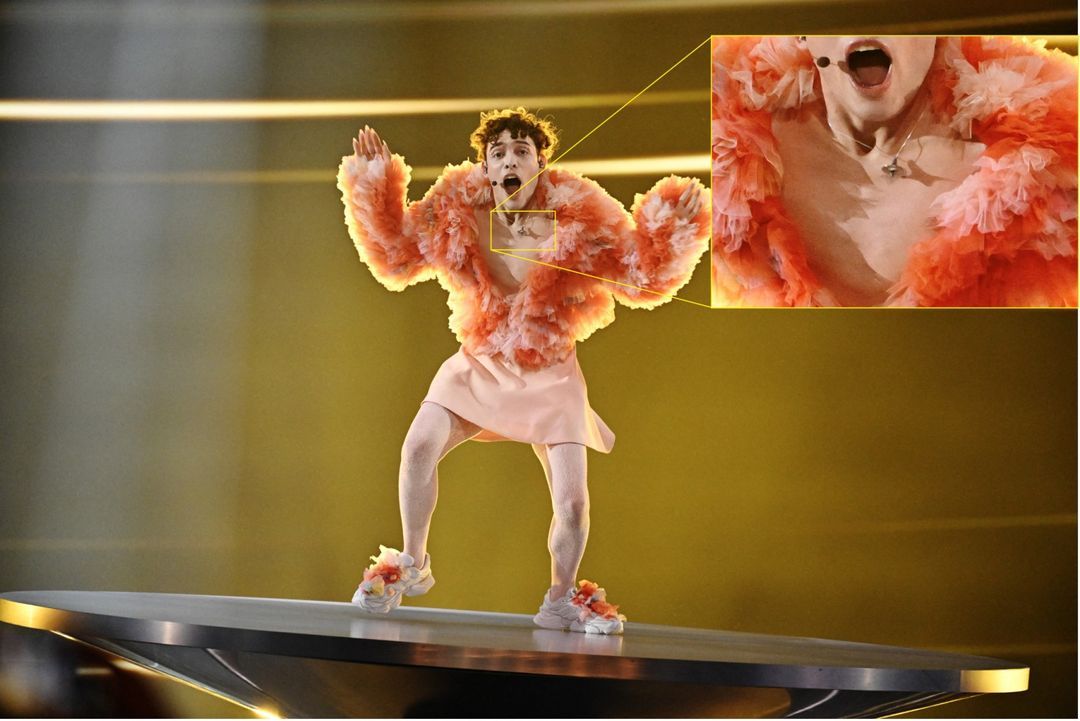Swiss musician Nemo won the 2024 Eurovision Song Contest in Malmö, Sweden, with their song “The Code”, becoming the first non-binary person to win the competition. Following their performance, Internet users and a Greek politician falsely claimed that Nemo was wearing an inverted cross, a “satanic” symbol, while singing. This assertion was used to spread discriminatory messages against the singer and the LGBTQ community, in the context of Greece recently legalising same-sex marriage and adoption. But visual evidence shows that Nemo in fact performed wearing a spinning top necklace, which they have said is a metaphor for their gender identity.
Switzerland’s Nemo won the Eurovision Song Contest on May 11, 2024, becoming the first artist identifying as non-binary to claim victory. Twenty-four-year-old Nemo’s “The Code” won the highest score from European nations’ juries, and enough of the popular votes to get 591 points, edging out Croatia in the final.
But claims soon began circulating on the internet in Greece that the Swiss artist “wore an inverted cross” during their show in a hidden attack on Christian values, branding him a “Satanist”.
The post also “dissects” the lyrics of his song, claiming that it is satanic.
“If he meant the molluscs he would be wearing a mollusc on his neck and not the inverted cross! (…)”, says a Facebook post in Greek from May 16, 2024, shared over 1,100 times since, referring to the mention of “ammonites”, a type of cephalopod, in the lyrics of Nemo’s song.
The author of the post is Grigoris Petrakos, whose claims about the Covid-19 pandemic have already been debunked by AFP.
Online articles have also regurgitated Petrakos’ claims here and here, without adding any context to it.
Similar posts with the claim that Nemo wore an upside-down cross during his concert have been shared on Facebook here and here.
“[…]Why is he wearing a inverted cross? (…) So, he hid in a seemingly LGBTQ ‘song’, a mockery of Christ himself, because I don’t know if you get it, the whole scene refers to calvary, crucifixion (…)”, says the caption of another Facebook post from May 12, 2024, shared over 300 times.
The leader of the far-right Elliniki Lysi (EL) party, Kyriakos Velopoulos, also slammed Nemo for wearing “an inverted cross” in a post on X. “When EL comes to power, no more Eurovision”, he wrote. AFP has already debunked his claims about the LGBTQ community here.
Visual evidence confirms that Nemo was not wearing an inverted cross, but a spinning top around their neck. What’s more, the toy was the central theme of their song and a metaphor for their sexuality, they told the Swiss press after the Eurovision win.
The anti-Nemo posts were accompanied by discriminatory comments directed against the LGBTQ community, as part of a wider backlash against sexual minorities that has proliferated online.
Greece legalised marriage and adoption for same-sex couples on February 15, 2024. Moreover, the Greek city of Thessaloniki will host EuroPride, an international pan-European LGBTQ event that includes a Pride parade, for the first time this summer.
As a result, anti-LGBTQ narratives have been circulating virally in Greece for the last year, and AFP has exposed such claims in Greek here, here, here, here, here and here.

Screenshots of the False Facebook posts (left, center left), the false article (center right) and the X post (right). Images capture: 21/05/2024
A spinning top necklace
A close look at Nemo’s performance at the Eurovision Song Contest on 11 May 2024 in Malmö, available on Youtube here (archived here), shows that they are not wearing a cross or any other religious symbol.
At 0:12 in the Youtube video, you can clearly see that their necklace is a metal spinning top, which rolls from right to left on their torso. It is circular in shape and not flat, as a cross would be.
This circular shape is all the more visible in a photograph taken during the performance, published by the Swedish news agency TT (archived here), as highlighted in the screenshot below:

Screenshot of the TT agency photo, with a zoom-in. Yellow squares and lines were added by AFP. Images capture: 21/05/2024
AFP’s photographers also produced photos showing what Nemo was wearing around their neck here:

Swiss singer Nemo celebrates after winning the final of the 68th Eurovision Song Contest (ESC) 2024 on May 11, 2024, in Malmo, Sweden – Tobias SCHWARZ / AFP
An advanced online search also enabled us to find the specific shape of the spinning top, on an online shop (archived here).
The shape of the spinning top can be seen by zooming in the photo and the same shape as the spinning top in the online shop can be observed, as highlighted in the image comparison below:

Screenshot comaprison between a zoom-in of the AFP photo (left) and from the foreverspin.com website (right). Images capture: 22/05/2024
This makes it possible to see the spinning top’s silvery surface. This same surface can also be seen on a Reddit post (archived here), showing a screenshot of a story (no longer available) from Nemo’s Instagram account.
In an interview with the Swiss daily Le Matin on May 9, 2024 (archived here), Nemo explained that their performance’s staging is based on the spinning top.
“The idea is that the stage is a binary world, black and white, with nothing in between. The spinning top, as it spins, ends up giving space to something else. That’s where I find myself. It’s my story, the story of someone who seeks his place in this binary world and ends up creating their own,” they told Le Matin.
The most shared Facebook post claims that the fact that Nemo wore an “inverted cross” would be proof that their performance seeks to convey a hidden “metahumanist” message. User comments below the post add that this is a hidden “satanic” performance.
Metahumanism is a philosophical trend that belongs to the post-humanist school of thought (archived here), and deals with the relationship between humans and technology, and the changes that follow, and has nothing to do with religion or even “Satanism”.
As Nemo explained in their interview with Le Matin, it was a performance of telling “their story”, not any such message.
“It’s very important for me to tell my story, not just stand on stage and sing for three minutes without any emotion”, they told Le Matin.
AFP tried to reach Nemo for a comment but received no reply by the time of the publication of this article.






